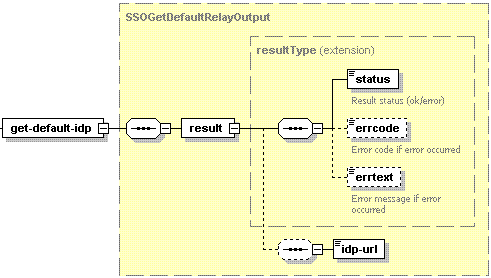Retrieving Default IdP URL
Use the get-default-idp operation to retrieve the default IdP URL.
Request Packet
A request XML packet retrieving the default IdP URL includes the get-default-idp operation node:
<packet version="1.5.2.0">
<sso>
<get-default-idp/>
</sso>
</packet>
The get-default-idp node is required. Data type: none.
Response Packet Structure
The get-default-idp node of the output XML packet is presented by type SSOGetDefaultRelayOutput (sso.xsd) and structured as follows:

- The result node is required. It wraps the response retrieved from the server. Data type: resultType (
common.xsd). - The status node is required. It specifies the execution status of the operation. Data type: string. Allowed values: ok | error.
- The errcode node is optional. Is returns the error code if the operation fails. Data type: integer.
- The errtext node is optional. It returns the error message if the operation fails. Data type: string.
- The idp-url node is optional. It returns the default IdP URL if the operation succeeds. Data type: base64.
Samples
The packet that retrieves the default IdP URL can look as follows:
<packet version="1.5.2.0">
<sso>
<get-default-idp/>
</sso>
</packet>
The positive response from the server looks as follows:
<packet version="1.5.2.0">
<sso>
<get-default-idp>
<result>
<status>ok</status>
<idp-url>aHR0cDovL3Nzby5leGFtcGxlLmNvbToxMTgwLw==</idp-url>
</result>
</get-default-idp>
</sso>
</packet>
A negative response from the server can look as follows:
<packet version="1.5.2.0">
<sso>
<get-default-idp>
<result>
<status>error</status>
<errcode>1026</errcode>
<errtext>The service is not installed.</errtext>
</result>
</get-default-idp>
</sso>
</packet>